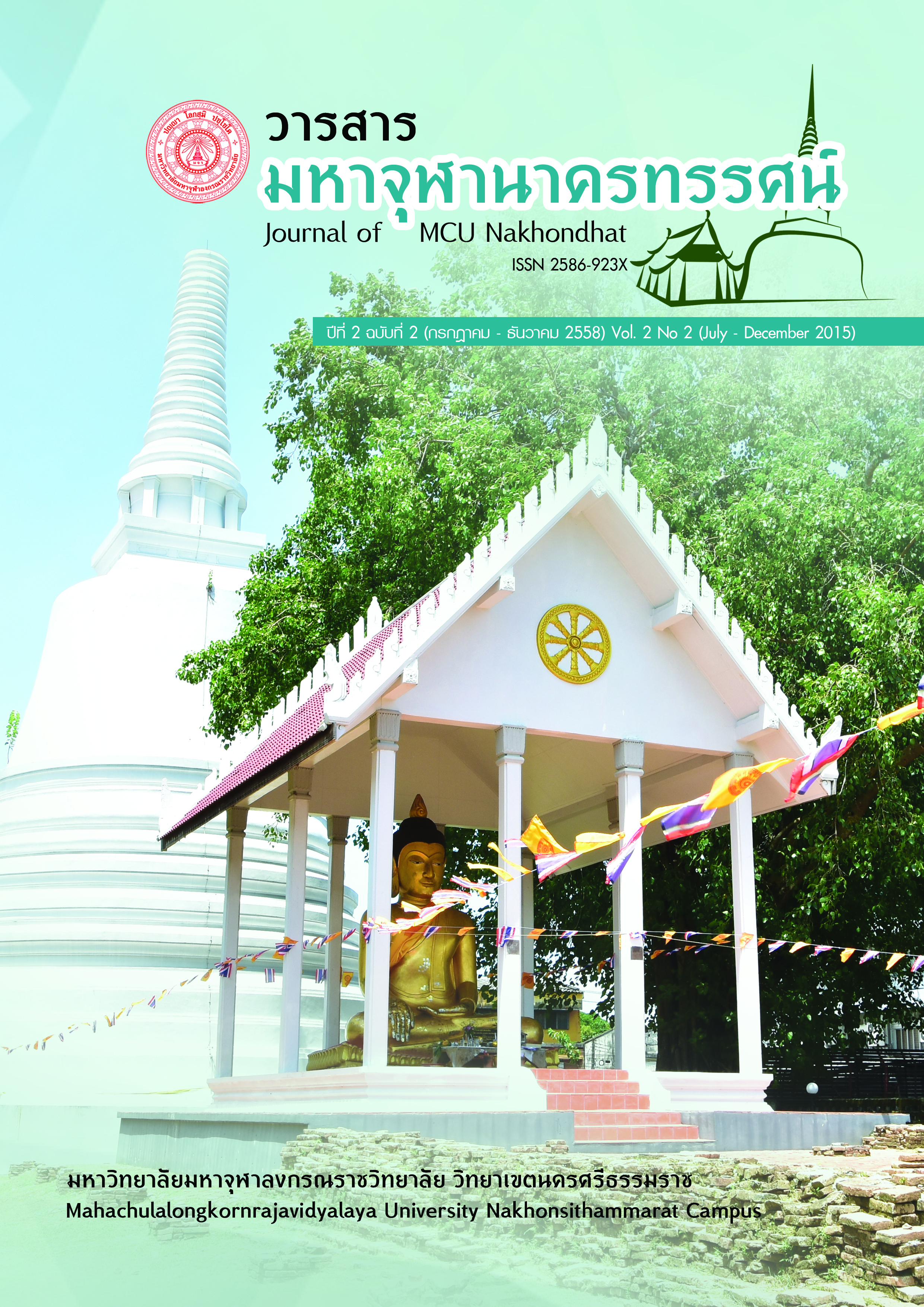A STUDY OF THE ROLES IN EDUCATIONAL ADMINISTRATION OF PHRATHEPPANYASUTEE (PROM KOVIDHO)
Main Article Content
Abstract
The research title on “A study of the role in educational administration of role Phratheppanyasutee (Prom Kovidho)," The objectives were as follows 1. to study the of educational management of Phratheppanyasutee (Prom Kovidho) 2. To study the role in educational management, concepts and methods for educational management throughout educational administration of Phratheppanyasutee (Prom Kovidho) this is the fualitative research, to study from doncuements, and indept interview from Concerned scholars which composed of promotion group, colleague group and pupil group.
The findings were as follows
- The history on educational management of Phratheppanyasutee (Prom Kovidho), found that he has provided on educational management both to Monk-novice and lay people, both secular school and vocational school with the objectives as follows. 1) For providing Buddhist studies and secular studies to monk and novice. 2) For promotion on educational and Dhamma practice. 3) For Memorial to southern San̊g̊ha in the past. 4) For dissemination of Buddhism. 5) For public welfare and co-operation with others merit making group, further more he has a vital role in Buddhist educational management in terms of Dhamma study, Pali study, and secular study each others, as a result, common people, society and Buddhism could be gotten the benefit.
- The role in educational management of Phratheppanyasutee (Prom Kovidho) found that he played teacher as a Buddhist Monk. and administrator by applying the concept of Yonisomanasikara, and educational administration in three aspects i.e. 1) Self administration, he performed on Sappurisadhamma to control body, speech, spiritual and wisdom 2) people administration, he performed on Buddhist ways i.e. Pahu Suta, Vudhidhamma for development of officers in organization and Hetthimdisa for giving powerful mind to ruled, Brahmaviharadhamma and Sangaha Vattu for binding people’s mind. 3) Job administration, he performed Iddhipäda for applying in daily life as well.
3. The result in educational management had effected to people in three group i.e. 1) Common people group, there are national personnel production, there are religious people to Sangha, developed personnel for Sangha, to solve the lack of religious personel. 2) Social group to be trained people in society along with virtue and ethics conduct, to promote happiness to people in society, giving an opportunity to the youth and common people both temple and community’s relations. and 3) Religious group; especially in religious teachings, the educational management in terms of Dhamma study, Pali study and secular study. these are the appearance of religious generation for sustainability and dissemination of Buddhism in the bright ways.
Article Details
References
กรมการศาสนา. (2554). คู่มือพระสังฆาธิการว่าด้วยพระราชบัญญัติ กฎ ระเบียบและคำสั่งของคณะสงฆ์. กรุงเทพมหานคร: โรงพิมพ์กรมการศาสนา.
นิภา แย้มวจี. (2549). กระทรวงศึกษาธิการ. กรุงเทพมหานคร : โรงพิมพ์กระทรวงศึกษาธิการ.
พระธรรมปิฎก (ป. อ. ปยุตฺโต). (2539). พจนานุกรมพุทธศาสน์ ฉบับประมวลศัพท์ ครั้งที่ 10. กรุงเทพมหานคร: โรงพิมพ์มหาจุฬาลงกรณราชวิทยาลัย.
พระธรรมปิฎก (ป. อ. ปยุตฺโต). (2541). การศึกษาเครื่องมือพัฒนาที่ยังต้องพัฒนา พิมพ์ครั้งที่ 2. กรุงเทพมหานคร: สำนักพิมพ์สหธรรมิก.
พระธรรมปิฎก (ป. อ. ปยุตฺโต). (2546). พุทธธรรม ฉบับปรับปรุงและขยายความ. กรุงเทพมหานคร: โรงพิมพ์มหาจุฬาลงกรณราชวิทยาลัย.
พระธรรมวรนายก (โอภาส นิรุตฺติเมธี). (2546). การพัฒนาวัดให้เป็นศูนย์กลางของชุมชน ในธรรมปริทัศน์ 46. กรุงเทพมหานคร: โรงพิมพ์มหาจุฬาลงกรณราชวิทยาลัย.
พระพรหมคุณาภรณ์ (ป.อ. ปยุตฺโต) . (ม.ป.ป.). บันทึกประกอบคำบรรยาย ในโครงการอบรมบัณฑิตอาสาสมัครสายประชาบาล. เรียกใช้เมื่อ 8 มกราคม 2555 จาก วัดญาณเวศกวัน: https://www.watnyanaves.net/th/book_detail/423
พระราชวรมุนี (ประยุต ปยุตฺโต). (2526). พุทธธรรม กฎธรรมชาติ และคุณค่าสำหรับชีวิต ฉบับเดิม แก้ไขปรับปรุง. กรุงเทพมหานคร: สำนักพิมพ์สุขภาพใจ.
พลาดิศัย สิทธิธัญกิจ. (2549). รัชกาลที่ 5 กับการปฏิรูปเมืองสยาม. กรุงเทพมหานคร: สำนักพิมพ์กู๊ดมอนิ่ง.
มหาวิทยาลัยมหาจุฬาลงกรณราชวิทยาลัย. (2539). พระไตรปิฎกภาษาไทย ฉบับมหาวิทยาลัยมหาจุฬาลงกรณราชวิทยาลัย. กรุงเทพมหานคร: โรงพิมพ์มหาจุฬาลงกรณราชวิทยาลัย.
รังสรรค์ บุษยะมา. (2550). การจัดการเรียนรู้. กรุงเทพมหานคร: โรงพิมพ์มหาวิทยาลัยราชภัฎธนบุรี.
วุฒิชัย มูลศิลป์. (2542 ). เมื่อเริ่มปฏิรูปการศึกษาสมัยรัชการที่ 5 - รัชกาลที่ 7. กรุงเทพมหานคร: บริษัท เวิลด์มีเดีย จำกัด.


